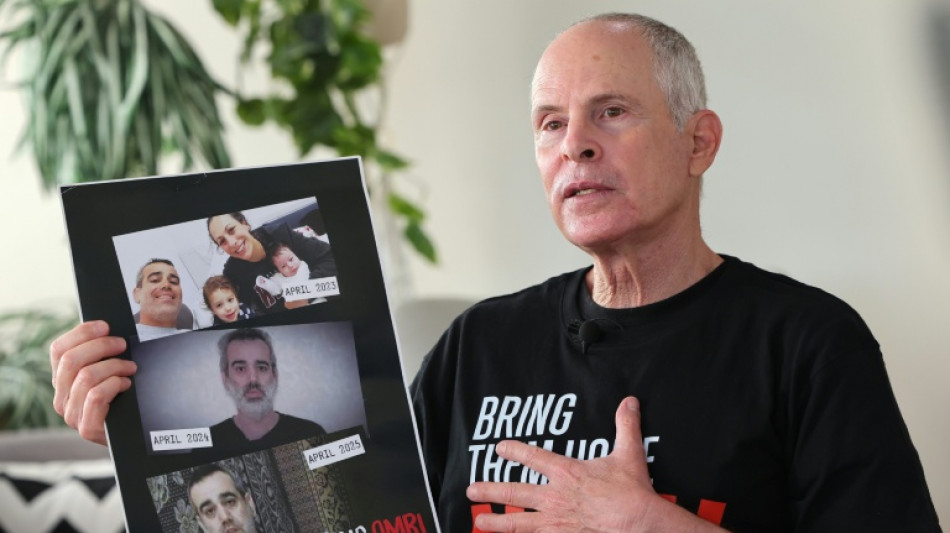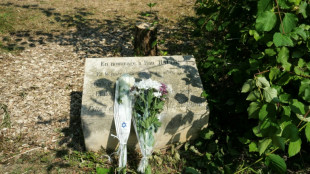
| RYCEF | -2.33% | 14.61 | $ | |
| BTI | -1.06% | 56.82 | $ | |
| CMSC | 0.41% | 23.186 | $ | |
| GSK | 0.24% | 38.895 | $ | |
| SCS | -0.19% | 16.17 | $ | |
| AZN | 0.31% | 78.715 | $ | |
| BCC | 0.64% | 87.18 | $ | |
| NGG | -0.29% | 71.35 | $ | |
| RIO | 0.71% | 61.475 | $ | |
| RBGPF | 0% | 73.08 | $ | |
| VOD | 0% | 11.64 | $ | |
| JRI | 0.43% | 13.3344 | $ | |
| CMSD | 0.43% | 23.3899 | $ | |
| BCE | 0.22% | 25.425 | $ | |
| RELX | 0.04% | 47.71 | $ | |
| BP | 0.49% | 34.31 | $ |

Freed Israeli hostage recounts 484-day nightmare in Gaza
More than four months since his release from Gaza, former hostage Keith Siegel bears the mental scars of 484 days of captivity in destroyed buildings and tunnels in the hands of Palestinian militant group Hamas.
The 66-year-old Israeli-American and his wife Aviva were among 251 hostages seized from residential communities along the Gaza border, army bases and a music festival on October 7, 2023.
In a recent interview with AFP, Siegel told of physical and sexual abuse that he had experienced and witnessed in captivity, and of the extreme stress of not knowing if he would ever see his family again.
In one incident, he recalled how his captor, out of the blue, pulled out a gun and said: "I'm going to kill you now."
"Then he said, 'now you're dead' and laughed," added Siegel, wearing a t-shirt with the words "Bring them home now", a call to free the remaining 52 hostages still in Gaza after more than 20 months.
One of the locations where Siegel was held was so far underground that he was "gasping for breath", he recalled.
"It was the most horrendous, or one of the most horrendous, situations that I was in."
He was first held with his wife, then with other hostages, as well as spending many months alone.
In total, he was moved throughout the Gaza Strip around 33 times, hidden inside tunnels or in bombed-out buildings and private homes.
During the darkest moments, Siegel said he used mindfulness techniques to stay strong, having long, imaginary conversations with family and friends.
- Nationality checks -
Throughout his ordeal, Siegel said he had focused on staying alive so he could see his wife, their four children and grandchildren.
"There were peaks of anxiety, fear and just the torture of not knowing, the uncertainty of not knowing," he said.
"I promised myself that I must return and was not able to think that I would not return. I think that gave me a lot of strength psychologically to get through the days."
Recounting some of the lowest points of his lengthy captivity, Siegel said one of his biggest fears initially was Hamas finding out that he was a US citizen, concerned that it could mean separating from his wife.
"At the very beginning, on October 7, they asked us all our names, our ages, where we're from, and if we have another nationality, citizenship... I said that I did not," he said.
"I was worried that they might release me (without Aviva), because I'm an American citizen."
She was released 51 days after the 2023 attack -- more than a year before he was, both under short-lived truce deals.
Siegel said he experienced taunts about his wife and daughter, and his genitalia, as well as extreme physical abuse that in two instances left him with broken ribs.
- 'Medieval-style torture' -
But it was witnessing the mistreatment of other hostages that made Siegel pause for breath during the interview and tear up.
"I witnessed a woman being tortured, literally," he said, describing it as "medieval-style torture".
"She was on her back, her hands were bound together, and also her feet, and they had put... tape, or a piece of material around her mouth so she couldn't talk," Siegel said.
"There was a man standing behind her with a metal rod that had a sharp point at the end of it and it was on this woman's forehead, and he was applying pressure."
Siegel did not name the woman, but his description matches an account given by released hostage Amit Soussana, in media interviews in which the 41-year-old lawyer said her captors had tried to make her confess to being an Israeli soldier.
For Siegel, having to watch the torture and being powerless to stop it still gives him "terrible thoughts".
"I just felt paralysed," he said.
- 'Bring the hostages home' -
Free now, Siegel remains fascinated with the departure "presents" handed over by his captors the day he left.
Inside a paper bag with a Hamas logo, there was a gold embossed "release certificate" signed by a commander from the group's military wing, two key rings with Palestinian flags, and a leather bracelet bearing the same flag.
Since returning home, he has become especially active in campaigning for the release of the remaining hostages.
Clutching posters of other captives he had spent extended periods of time with -- Matan Angrest, Omri Miran, and twins Gali and Ziv Berman –- Siegel called on Israeli Prime Minister Benjamin Netanyahu and US President Donald Trump "to bring an end to the suffering, bring an end to the war and bring the hostages home".
G.Vitali--GdR



